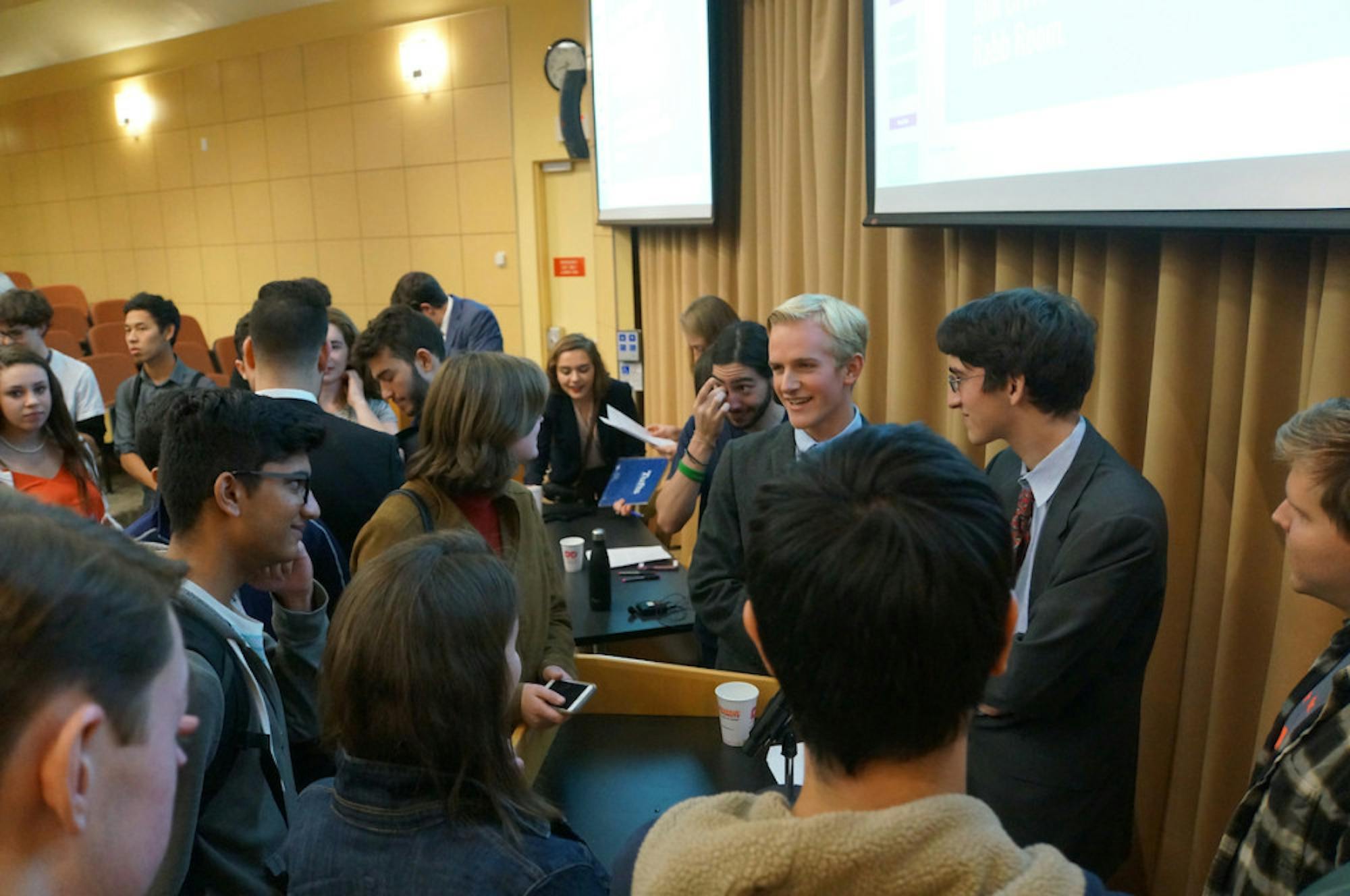Approximately 100 students gathered to watch two Tufts Republicans and two Tufts Democrats argue on behalf of the opposing side’s party platform in Tufts CIVIC's "The Last Debate" on Nov. 4 at 7 p.m. in the ASEAN Auditorium.
First-years Robert Whitehead and Bennett Brain of Tufts Republicans faced off against Tufts Democrats sophomore Nesi Altaras and senior Ben Kaplan.
The debate, which was co-sponsored by the Jonathan M. Tisch College of Civic Life, was moderated by CIVIC curriculum director Gabriella Roncone and CIVIC member Zach Merchant, a senior.
The debate was divided into four sections: domestic policy, foreign policy, audience questions and a final section addressing the question, “After spending two hours arguing for your usual opponent’s side, what have you learned from this exercise? Anything surprising?”
Questions were put together by the Tufts CIVIC executive board and finalized by the moderators after background research into each topic, Roncone, a sophomore, said.
CIVIC co-leader Matthew Felsenfeld said that the group’s objective in the debate was to educate the campus a little more about both parties’ platforms and policy agendas, which presidential candidates did not fully cover in the televised debates.
“We aim to bring the left, the right, anyone from the political spectrum together to have a meaningful, productive political conversation about current political issues,” Felsenfeld, a senior, said. “It was our feeling that candidates have not really been talking about policy issues so we wanted Tufts Democrats and Tufts Republicans to actually have that conversation in an open forum.”
Whitehead said he was pleased with the result of the debate and would like to see more discussions of the sort on campus.
“I learned from this debate that it is very nice to actually have a serious debate with people across the aisle and once you … remove the context of an acrimonious and very decisive election, you have a much higher chance of having a more productive and substantive discussion,” he said. “CIVIC told us we are debating other party’s platform, not the candidate, so I read the Democratic platform [and now] I know where they are coming from.”
However, Whitehead said he wished that Tufts Democrats had represented segments of the Republican Party that are not fully endorsing Republican presidential nominee Donald Trump.
“[Tufts Democrats] did a good job in representing the Trump wing of the party, which is the largest but is not [a] majority of the view,” he said. “[The Republican] platform did change in response to that but it is a diverse party."
Tufts Democrats debaters agreed that the debate was fun and informative, but they had a different opinion on the Republican Party’s platform and to what extent Trump represents the GOP.
"Other Republican candidates before were good Americans who wanted the best for our country in their minds, but this is not the case for Trump," Kaplan said. “What [the] Republican Party has become now is a party of Trump, and his ideas have changed the Republican Party’s platform.”
Both the Tufts Democrats and the Tufts Republicans agreed that the political plurality in the United States was not fully covered in major debates and many independent voices are lost during the election cycle.
However, Kaplan believed that in the end there are two major options and voters should make “strategic choices” in order to make their voices heard most effectively.
Whitehead, a registered Libertarian, was disappointed that the debate did not include third-party voices.
“[The debate did] not cover two fairly significant chunks of people, the Green Party and the Libertarian Party, which is tragic, but it is more because Tufts itself does not have clubs for those parties,” he said.
Eva Kahan, a sophomore in the debate audience, said she thought the side-switching aspect of the debate added interest but made it more difficult for the speakers to accurately portray the other side's point of view.
"I was wondering, is there a way to make sure [debaters] are really invested in accurately portraying the other side and understanding the other side?” she said. “I feel like that maybe requires appealing to people’s own beliefs and addressing them directly than just putting them as play actors, but it still was an awesome idea and something we need more on campus.”
CIVIC hosts debate between Tufts Democrats and Republicans






